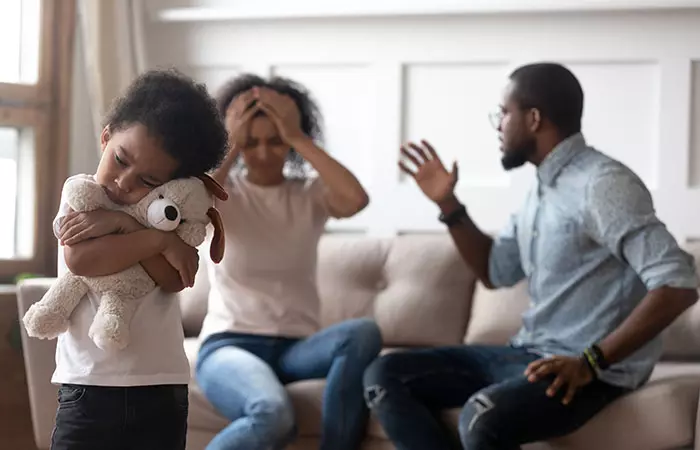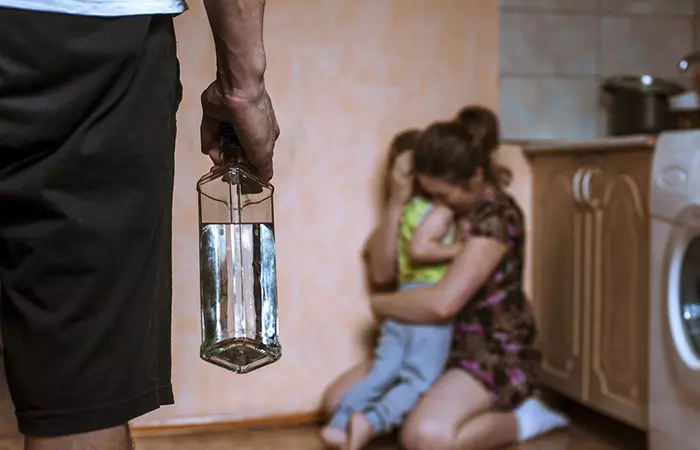Dysfunctional Family: Complete Guide To Signs And Solutions
Trust issues and lack of healthy boundaries can negatively affect your mental health.

Image: Shutterstock
Every family comprises opinionated individuals, and conflicts can be common. But when these conflicts blow out of proportion, it gives way to a dysfunctional family. No family is perfect, but if the members keep ignoring the unhealthy system, they might start developing secrecy, neglect, and even disrespect for others.
Such situations often lead people to depression and unresolved emotional traumas. Punishing and abusing kids or blocking out their opinions can affect their mental health severely and render them unable to express their feelings in proper ways. Such an environment invalidate their needs, and they eventually grow up to be immature adults, or individuals with low self-esteem. Also, such families often experience chaos, anxiety, and violence.
In this article, we will delve deeper into the topic of family that seems incapable of maintaining a peaceful environment. This elaborate discussion will help you analyze the situation better and how to handle it. Swipe up for more details.
In This Article
What Is A Dysfunctional Family?
A healthy family is one where the family members are attuned to each other’s moods, needs, wants, emotions, and health. On the other hand, a dysfunctional family is rooted in conflicts, neglect, emotional disturbance, abuse, lack of communication, and exploitation. The most prominent emotions felt by one or more family members are anxiety, secrecy, denial, or addictions.
No parent is perfect, but there are bad parents – not the ones who scold you, but those who are abusive, toxic, shaming others, punishing, and brushing off responsibility. Unfortunately, such families affect the child more than the people involved. The child in a dysfunctional family might feel neglected, experience abuse, and have low self-worth and other psychological disturbances, depending on the gravity of the situation. They may even have an inferiority complex and difficult relationships as adults.
You may feel overwhelmed and trapped by the dysfunction in your household with the ongoing family conflict, communication breakdown, domestic violence, and toxic relationships. This may possibly lead to separation, divorce, or estrangement, as the generational patterns of emotional instability, enmeshment, codependency, and boundary issues continue to fuel the unresolved issues within your family dynamic.
 Trivia
TriviaThe signs of dysfunctionality can be seen through different aspects of a person’s life. They range from how a person communicates with others to how their parents or guardians behaved with them in childhood.
Here are the signs that you grew up as a part of a dysfunctional family.
Signs You Had A Dysfunctional Family
- You are a people-pleaser
- You have become a perfectionist due to a fear of failure and punishment
- You constantly feel guilty, obliged, and answerable
- You lack proper communication skills
- You feel responsible for others
- You are hard on yourself
- Anxiety, hopelessness, or anguish trouble you most of the times
- You prefer seclusion or isolation, even with a companion
- You have trust issues
- You are always dissatisfied due to a lack of appreciation for your efforts
- There is sibling rivalry
- You faced favoritism by a parent based on your gender, color, and area of interest
- Your parents or guardians had different private and public personas
- You lack healthy boundaries and privacy
- You deprive yourself of food as a punishment or overeat
- You or your parents abuse drugs, alcohol, or other substances
- Your parents threatened to abandon you
- You were punished for talking, replying, voicing thoughts, or pursuing hobbies
- You were not allowed to experience childhood, treated like an adult
A child that grows up in a dysfunctional family may feel secluded, keep to themselves, and struggle to socialize. Dysfunctional family environments can cause a child to develop unhealthy coping mechanisms. They may not trust others easily and have trouble forming intimate relationships. Here are some common traits that show up as long-lasting effects of growing up in a dysfunctional family.
What Happens When You Grow Up In A Dysfunctional Family?
- Social isolation or loneliness
- Behavioral or personality disorders
- Bad or low self-image
- Extremely self-critical
- Low self-esteem, self-confidence, and self-worth
- Anxiety or depression
- May exhibit self-harming tendencies
- Difficulty expressing thoughts and feelings
- Poor academic performance
- Difficulty concentrating and focusing on one task
- Prone to substance abuse
- Difficulty establishing healthy adult relationships
- Easily and frequently getting angry
- Lack of child-like innocence (too mature for their age)
- Lack a role model and discipline
There are different kinds of dysfunctional families based on the root causes and parental behaviors. Sometimes, there can be a combination of more than two types of dysfunctional families at the same time.
Types Of Dysfunctional Families
- Emotionally Unavailable Family: The members of such families are not emotionally available for each other due to various reasons. They might be working for long hours to make ends meet and leave the child with a caretaker or on their own. Other times, they are overseas for work or traveling, which compels them to be unavailable at home or emotionally. They could also be families that are on screens most of the time. This causes an emotional rift between the parents and the children.
- Addict Family: A family with one or both parents being addicts of some substance are always absent for their kids and may sometimes be financially unstable. They neglect the child when in a trance and don’t care for their basic needs, such as proper living conditions, healthy diet, clothing, education, and medical expenses.
- Abusive Family: Abusive family members use the threat of physical punishment as a means to accomplish a task or control their partner or children. The child might have witnessed the verbal abuses, cuss words, rudeness, or violence or been at the receiving end of the punishment.
- Poor Communication Family: The members of such a dysfunctional family do not know how to communicate. They may interact only when necessary and continue with their tasks without crossing paths with each other. A family with weak communication skills does not discuss issues but believes that their finances will solve all problems. There is no healthy exchange of words or views (either silence or shouting or screaming) – complete apathy.
- High-Conflict Family: It refers to families where the family members are always ready to fight. Even for the smallest of inconveniences, they would rather shout than talk it out. They use harsh words, taunts, sarcasm, snapping, jabs, and insults and may even involve physical violence. The intensity of the fights keeps increasing with every hurtful word spoken.
- Exploitative Family: This family type mostly tends to exploit their children or partners. It might be for money, possessions, or personal work. Exploitative family members believe that the children live with them to do their work and bidding, while the kids’ needs are non-existent.
- Authoritarian Family: In this family type, one or both parents exert authority and control over the children. They make strict rules that have to be followed by the children without question. The parents order the children to stick to the family’s rigid belief systems – religious, political, or financial, without leaving room for personal choice.
Family plays an important role in not only shaping our personalities but the roles we play in our homes. Check out the next section for some common roles in dysfunctional families.
Common Dysfunctional Family Roles
Every person, be it the parent or the child, adopts different characteristics that define their role in the family. Here are some of the roles seen in dysfunctional families:
1. The Hero
This member appears to be a highly-functioning individual who creates the image that the family is doing well. They grow up to be overworking perfectionists who are constantly drawn towards achievement.
2. The Golden One
The member who can do no wrong. This individual grows up with low self-esteem and seeks constant validation from external sources.
3. The Scapegoat
This member is the opposite of the hero and often blamed for the family’s problems even if they have nothing to do with them. They grow up to be very honest impulsive individuals who are struggling inside emotionally.
There are various reasons for a family to become unhealthy, toxic, and dysfunctional. Scroll down to find out the root causes that lead to fights and disharmony in the family.
What Are The Reasons For Dysfunctionality In Family?
- Family History Of Dysfunction: Parenting styles are behaviors learned through observing and reflecting from their parents or caregivers. Therefore, dysfunctional parents may easily reflect the same behavior or go overboard in their way. Since they do not know what healthy parenting is, they cannot teach their kids either. The cycle continues until someone breaks it and goes down the right path.
- Health Issues And Mental Illness: A chronic illness, cancer, or even an accident that might have resulted in the amputation of a limb can make a person feel less useful than they previously were, resulting in low self-worth. This situation is deflected onto others as a form of coping mechanism. Psychological causes like depression, anxiety, or personality disorders can change a person’s mood directly or through medication. For example, a person with a psychological illness might develop conflicts in the family without proper treatment. People with mental health issues can be emotionally unavailable or unpredictable, which doesn’t create a secure attachment in children.
- Addiction: Addiction is one of the major reasons for discord in family relations. It usually starts with the denial that a family member can be an addict, followed by the various impromptu attempts to prevent them from getting any substance to binge on. This results in withdrawal syndrome, a serious series of physical and mental symptoms that occur when the intake of the addictive drug is stopped. It is difficult for children and partners to understand why another substance or behavior (e.g., gambling, gaming, porn/affairs) can be more important than them.
- Perfectionism And Constant Criticism: The perfectionist parent who is conditioned to keep everything in a specific order might prove unhealthy for other family members in the long run. It might come from a learned behavior from their parents or an innate compulsion. This entails criticism (sometimes too overwhelming to be excessive), swearing, scolding, sarcasm, insults, jabs, and even abuse.
- Authority: An authoritarian parenting style that imposes rules, expects results, and doesn’t entertain any slip-ups can lead to weak family bonds. It hinders a child’s growth and encourages unhealthy behaviors like not speaking up, accepting wrongdoings, or getting abused without defending themselves.
- Lack Of Empathy: Lack of empathy comes from a lack of understanding of emotions. As a child, when a person’s emotions, feelings, and thoughts are not acknowledged, they don’t develop the basic knowledge of how to recognize and empathize with others’ emotions. This makes a child socially isolated, hampers their ability to communicate strongly, and they tend to behave coldly and devoid of kindness.
- Ineffective Communication: Lack of socialization might lead to a lack of effective communication. It also roots from their unwillingness to listen, but they need to always respond. People in dysfunctional families do not reflect whether their response is useful, hurtful, or completely irrelevant – they always have to have the last word. They are usually aggressive and don’t easily confide in anyone.
- Lack Of Privacy And Independence: This comes from a lack of trust in the child or the need to know and persuade events the way they prefer it. While a healthy family would talk, a dysfunctional family works through room raiding to be in loop with the family members.
- Finances: When there is a deficit in financial resources, the stress can hugely affect the family members directly or indirectly. Parents usually try to protect their children during such a crisis in a healthy family. However, in a dysfunctional family, the parents start neglecting the child’s needs to save money while spending it on themselves, alcohol, and other indulgences.
 Quick Tip
Quick TipThe steps mentioned in our following section are a guide to help you deal with a dysfunctional family and not set in concrete. Consider the points that might help you, improvise on others, and go through what seems to best suit you.
How To Deal With A Dysfunctional Family
- Reflect On Your Choices: Consider the two very crucial options you have at hand – to stay or to move on. None of the options are wrong. It is good to stay and help your family become better. On the other hand, it is also completely alright to get distant from your family and work on yourself. The choice is all yours, based on how sensitive and fragile the situation is.
- Build Your Support System: Build a network of people whom you can rely on. They can be friends, family members, church groups, colleagues, or housemates that you believe you can trust. Someone who knows your situation but is ready to help you find your footing.
- Stop The Victim Behavior: Stop being a victim and start living for yourself. Mourn the past if you have to and then move on. Work on yourself and your present relationships. Focus on all the things you want to change about yourself and become a better, healthier version of yourself.
- Be Your Own Responsibility: You are now responsible for yourself. You might have people you can depend on, but at the end of the day, the person you can completely depend on is you. Therefore, it is now your responsibility to take care of yourself and overcome the hardships of the past. This will allow you to establish new, healthy emotional connections. Set expectations for yourself and meet them slowly and steadily. Do not try to rush into things.
- Seek Help: Asking for help is never bad or embarrassing. Those who can ask for help are the ones who can benefit the most from it. You can seek professional help to unlearn any unhealthy and harmful behaviors.
- Get Creative: Creativity can flow even through the gravest of times. So, use your emotions and energy creatively – paint, write a poem or a story, sing, dance, or anything that will allow you to express yourself in a language that only you will truly understand. This exercise can help you build yourself with greater confidence, self-esteem, and self-worth.
- Do Not Lose Trust: Building trust is not easy. It involves taking a risk. Carefully decide who may be worth the risk. It is a cumulative effort of all the members towards the same goal. Trusting a fellow human being gets difficult with age, and it is nearly an impossible thought by adulthood. Therefore, build trust only with those family members you are closest to. Others can stay behind the line and watch.
- Set Healthy Boundaries: Last but not least, set healthy boundaries with every person in your life. Boundaries can be physical and emotional. Be it your friends, family, relatives, or partner, draw a boundary that no one is allowed to cross without your consent. Boundaries help you establish and protect your limits – they also make you feel safe.
Children’s formative years need utmost attention and care, and a dysfunctional family does not contribute to this. If there are major disturbances in the household and there is a lot of anxiety among people in the family, children’s needs are often neglected. As a result, children come across abuse directly or indirectly, which hurts their overall growth. It is really important to understand that the kids’ feelings are also important. So, to survive in a family like this, it is essential to set healthy boundaries and focus on the upbringing of the kids.
Frequently Asked Questions
Does everyone have a dysfunctional family?
No, not everyone has a dysfunctional family. It is important to understand the subtle signs and work on them to improve the dynamics within your family.
What are the unspoken rules of a dysfunctional family?
Rigidity, silence, isolation, denial, and punishments are some of the unspoken rules of a dysfunctional family.
Who is the victim in a dysfunctional family?
There is no one victim in a dysfunctional family. It is a complex situation with many threads. The enabler of dysfunction might him/herself be a victim of certain trauma or situation. However, in most cases, children are the ones who suffer the most, and have a major impact on them.
What is the golden child in a dysfunctional family?
The “golden child” in a dysfunctional family is referred to as the one who is preferred over the other children. He or she is praised or rewarded often while the other siblings are ignored or neglected.
What is shame in dysfunctional families?
In dysfunctional families, shame is used as a powerful weapon by parents or people in authority to manipulate or control others. They shame people for their shortcomings, and inadequacies, or for simply expressing their views or feelings, further aggravating their insecurities resulting in incapabilities, guilt, and a feeling of worthlessness.
Who is the scapegoat in a dysfunctional family?
The scapegoat in a dysfunctional family can be considered the opposite of the golden child. It is the person who is blamed for everything that goes wrong in the family and labeled as the source of all conflicts and is punished more severely than the others.
What is the mastermind in a dysfunctional family?
Although all members of a dysfunctional family suffer in one way or the other, the mastermind is the person who has a disproportionate amount of control and power over the other members of the family. They affect the sense of autonomy of the other members of the family which results in low self-esteem and dependency.
Key Takeaways
- A dysfunctional family is rooted in conflict, neglect, emotional disturbance, abuse, lack of communication, and exploitation.
- Dysfunctional family environments make the child develop unhealthy coping mechanisms.
- Healthy boundaries help you establish and protect your limits – they also make you feel safe.
Uncover telling signs that you may have grown up in a dysfunctional family. Check this eye-opening video to explore the impact of family dynamics and gain insights for healing and personal growth.
Read full bio of Michele Waldron
Read full bio of Sneha Tete
Read full bio of Subhrojyoti Mukherjee
Read full bio of Gracia Odile


































Community Experiences
Join the conversation and become a part of our empowering community! Share your stories, experiences, and insights to connect with other beauty, lifestyle, and health enthusiasts.